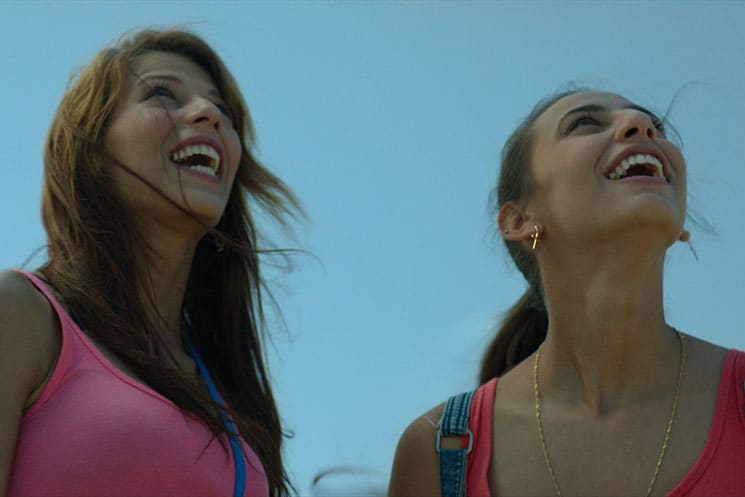Carmen y Lola (Carman & Lola) tells of a queer awakening between two young women in Madrid's tight-knit Romani community, meaning that it functions as both a love story and an ethnographic look at cultural customs that rarely grace the big screen. It's a beautiful romance — although audiences might be left wondering if this is really writer-director Arantxa Echevarria's story to tell.
The titular teens both work at their respective family stalls in a market in suburban Madrid. Carmen (Rosy Rodriguez) is engaged to be married, and the early part of the film focuses on the community's elaborate prenuptial traditions and strict patriarchy.
Lola (Zaira Romero), on the other hand, is more of an outcast. She's a shy street artist who privately identifies as lesbian and dreams of becoming a teacher — much to the chagrin of her traditionalist father (Moreno Borja), who would rather she attend church and get married and have children as soon as possible. She's instantly attracted to Carmen, and while her advances are initially met with homophobia, a secret relationship soon blossoms.
The queer awakening story follows a fairly predictable trajectory, from curiosity to passion to family drama. But even if this isn't the most original love story, it's still a touching romance with an upsetting climax. The families are deeply concerned with both Christian virtue and social reputation, which raises the stakes for Carmen and Lola's forbidden love. Their tender interactions have echoes of a Jane Austen novel, where even subtle touches and passing comments carry tremendous weight.
Echevarria doesn't belong to a gypsy community herself, and she told Variety earlier this year, "Many gypsy women have discredited me. They ask me how dare I be the voice of an ethnicity I don't belong to." She clearly took pains to be authentic, and the entire cast is made up of non-professional Romani actors, but it's worth noting that this fictionalization of inter-community strife — which is unflattering at times — comes from the perspective of an outsider. (Eurozoom)
The titular teens both work at their respective family stalls in a market in suburban Madrid. Carmen (Rosy Rodriguez) is engaged to be married, and the early part of the film focuses on the community's elaborate prenuptial traditions and strict patriarchy.
Lola (Zaira Romero), on the other hand, is more of an outcast. She's a shy street artist who privately identifies as lesbian and dreams of becoming a teacher — much to the chagrin of her traditionalist father (Moreno Borja), who would rather she attend church and get married and have children as soon as possible. She's instantly attracted to Carmen, and while her advances are initially met with homophobia, a secret relationship soon blossoms.
The queer awakening story follows a fairly predictable trajectory, from curiosity to passion to family drama. But even if this isn't the most original love story, it's still a touching romance with an upsetting climax. The families are deeply concerned with both Christian virtue and social reputation, which raises the stakes for Carmen and Lola's forbidden love. Their tender interactions have echoes of a Jane Austen novel, where even subtle touches and passing comments carry tremendous weight.
Echevarria doesn't belong to a gypsy community herself, and she told Variety earlier this year, "Many gypsy women have discredited me. They ask me how dare I be the voice of an ethnicity I don't belong to." She clearly took pains to be authentic, and the entire cast is made up of non-professional Romani actors, but it's worth noting that this fictionalization of inter-community strife — which is unflattering at times — comes from the perspective of an outsider. (Eurozoom)
